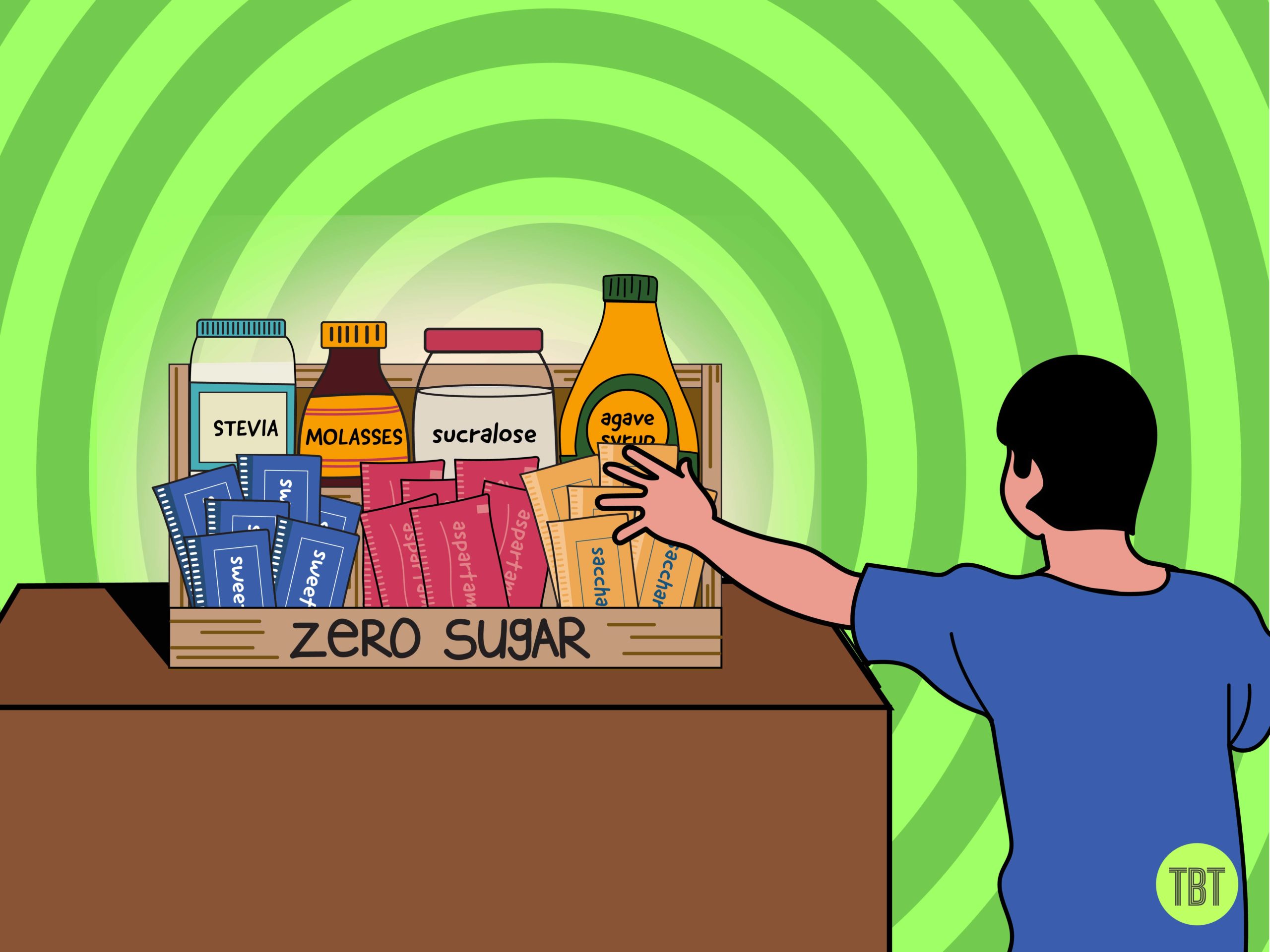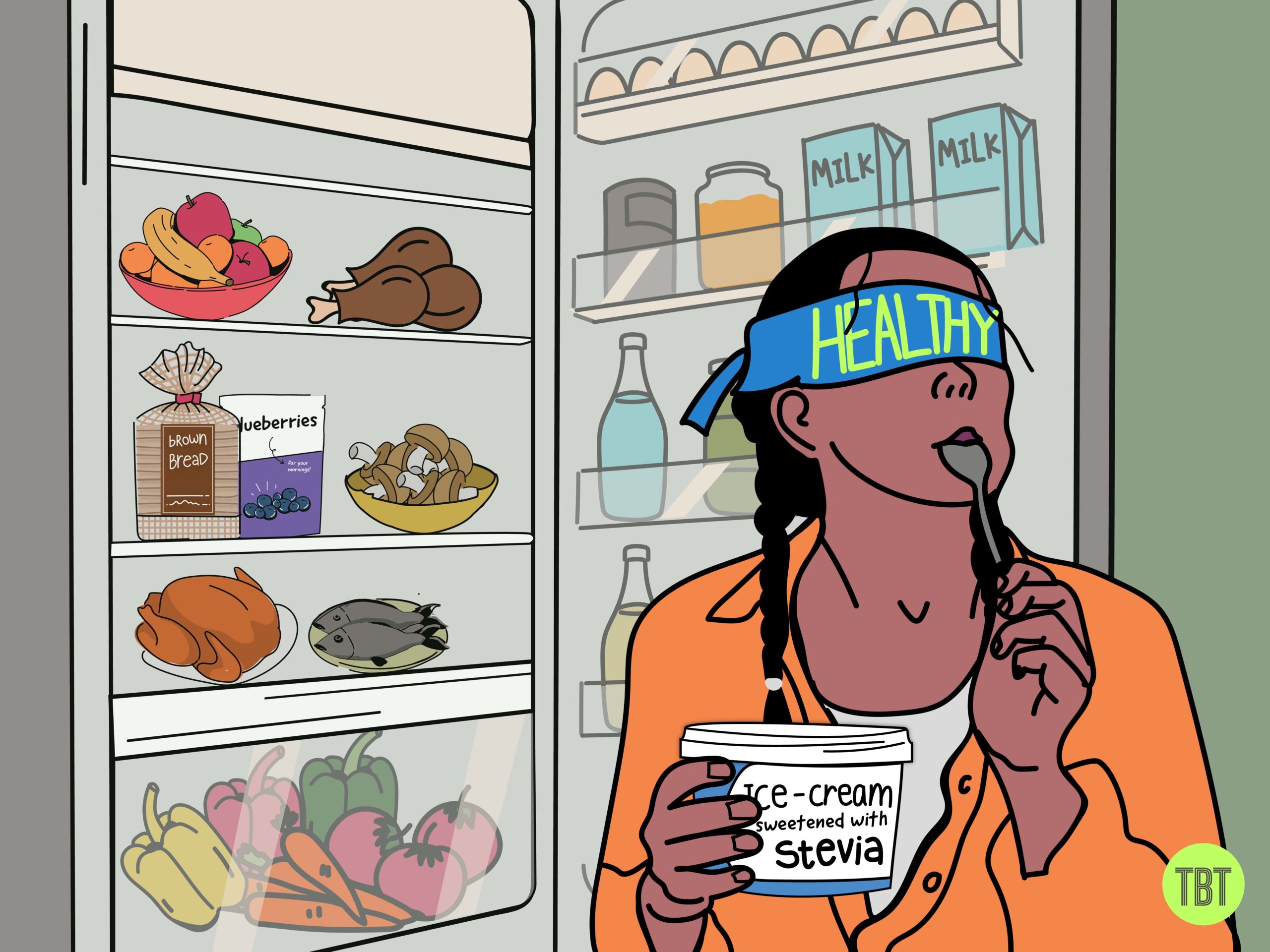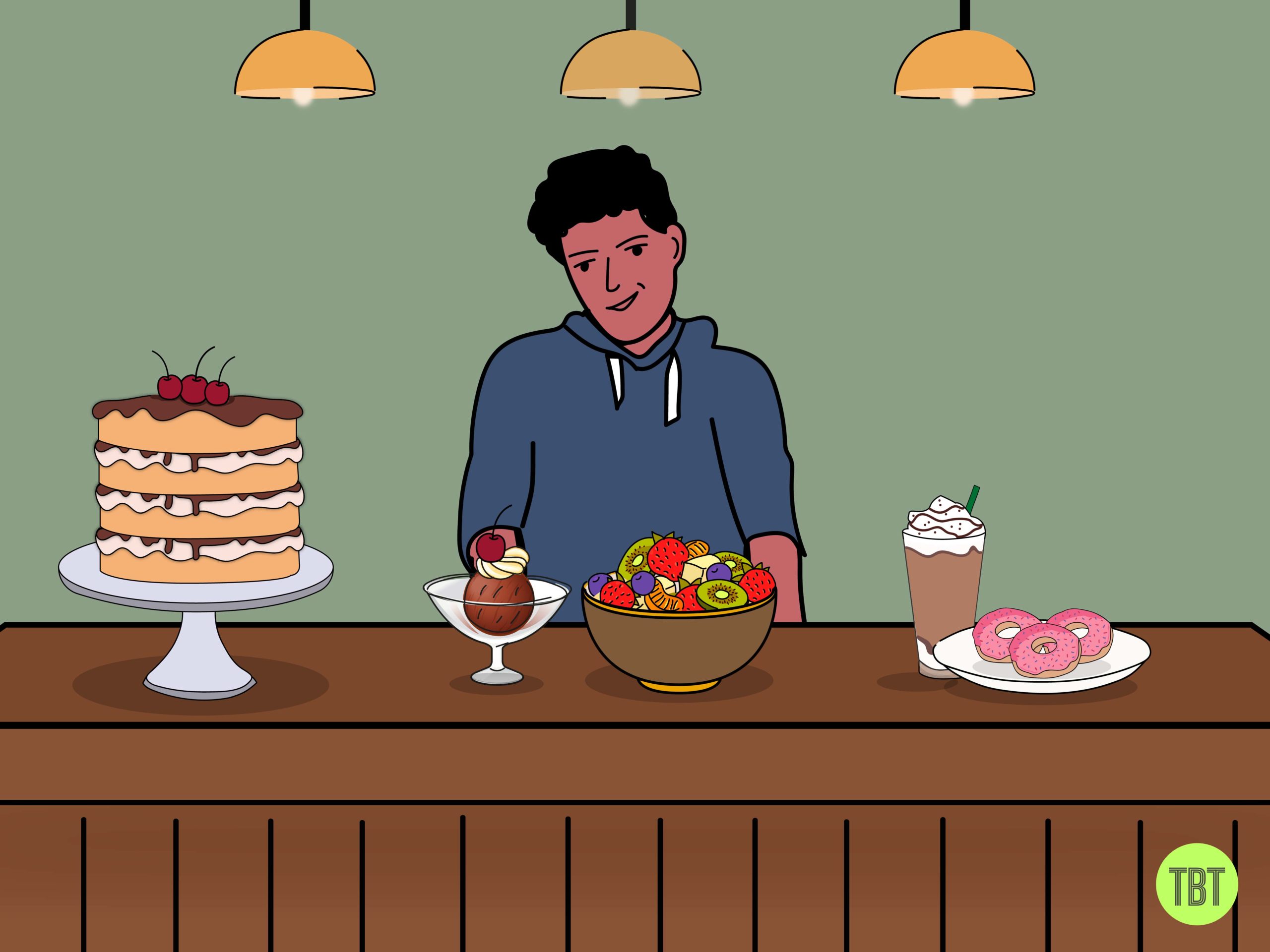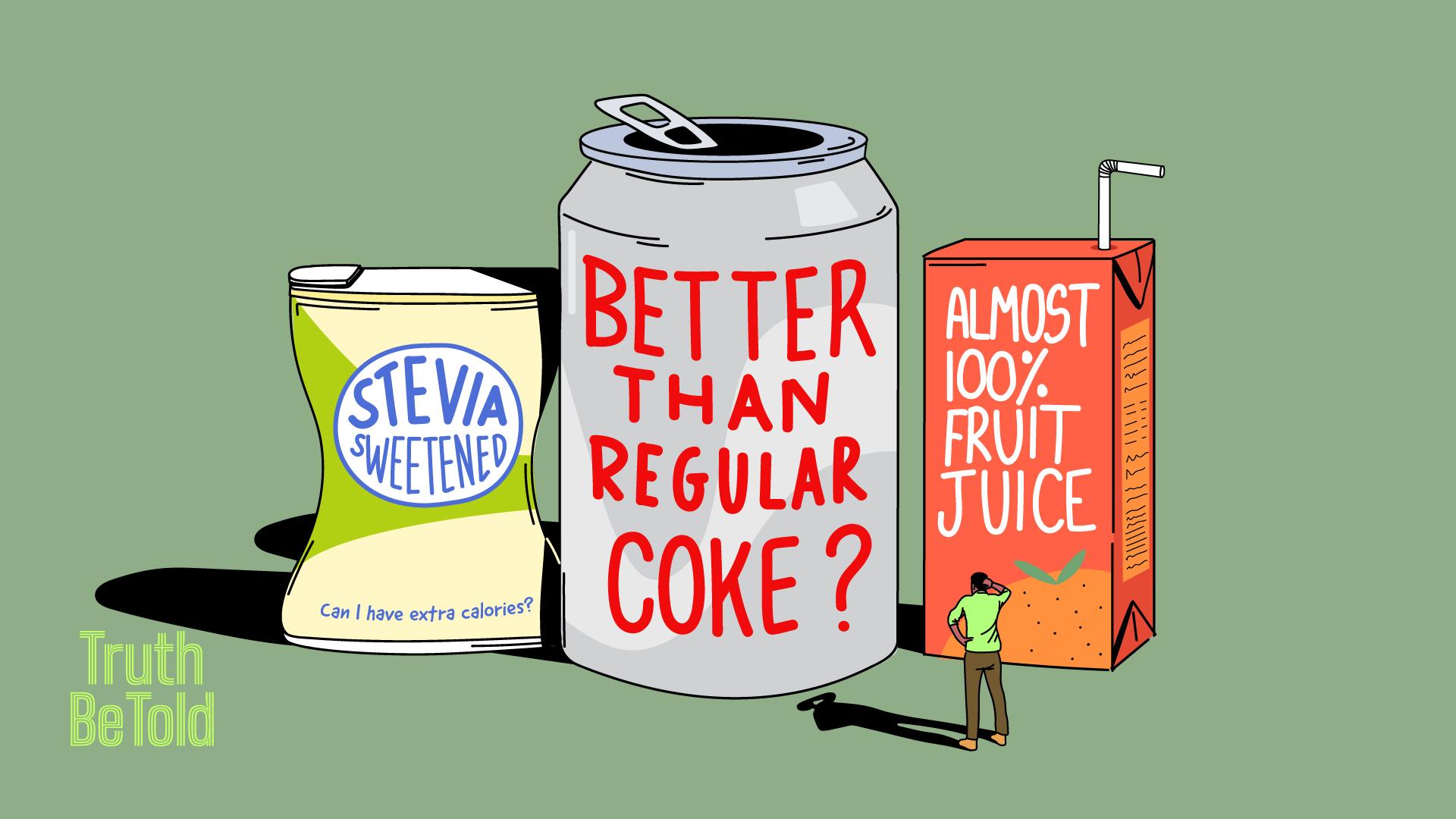Are artificial sweeteners healthier than sugar?
Sugar vs artificial sweeteners: Pick your poison
The most trustworthy source of food and
fitness journalism in the country.
Hello there, this is Samarth Bansal, the Editor of this newsletter, writing today’s issue. I will talk about sweeteners.
On Thursday, the World Health Organisation declared that aspartame, the artificial sweetener found in sugar-free products like diet sodas, chewing gums, and energy drinks, has a possible link to cancer.
Just a couple of months earlier, the WHO had issued a stern warning against sweeteners in general, highlighting their questionable long-term effectiveness and health risks.
This news should have brought me joy as I typically avoid artificial sweeteners. It didn’t. Because regrettably, these announcements triggered a surge of fear-mongering, leaving some people more confused and anxious, asking themselves, ‘Will drinking diet soda kill me?’
The short answer is: it won’t.
While from a distance it may seem like the WHO is saying diet soda will lead to cancer, it is not really saying that. I mean…look at the finer details: the WHO states that it is safe to consume up to 40 milligrams of aspartame per kilogram of body weight, which is equivalent to more than a dozen cans of diet soda for a 70-kg person. (If you are drinking that many cans of anything, you don’t need studies to show something is off.)
And the evidence overall is weak. It’s just a case of really terrible messaging. So this news is worth ignoring. (If you’re interested in delving into the specifics of this classification, I recommend reading this article.)
But anyway, let’s talk about sweeteners.
If you’re a regular Truth Be Told reader, you know we’re passionate about science. It guides our perspectives on food and fitness. However, scientific intricacies sometimes fall short of translating knowledge into action, particularly when we don’t have definitive answers—like about sweeteners.
So, in today’s piece, I won’t delve into scientific details and restrict myself to straightforward, common-sense chat on sugars, sweeteners, and our sugar-laden diets.
1. Sugar is problematic: The health risks of overeating sugar are well established. Not a debate. Obesity, type-2 diabetes, heart disease, tooth decay, and many other conditions are closely linked to excessive sugar consumption.
2. Our natural craving for sweetness: It’s hardwired into our biology. Our taste buds, with thousands of tiny sensors in our mouths, have special receptors sensitive to sweetness. Eating something sweet sends signals to our brain’s pleasure centres, making us feel good.
Our preference for sweetness also has an evolutionary basis. For our hunter-gatherer ancestors, sweet fruits provided a quick burst of energy in times of scarcity. Our bodies adapted to enjoy the taste of sweetness as a survival advantage.
3. The mismatch between our biology and modern lifestyle is the problem: Our modern world is filled with sugary foods and drinks that our bodies can’t handle. We weren’t designed to handle the constant onslaught of high-energy, high-sugar foods. This mismatch contributes to the problem. And it contributes to the rise of diseases like diabetes.
Tell someone with a similar lifestyle👥
4. The illusion of sweet bliss: The desire for sweet-tasting products without the drawbacks of sugar led to the introduction of artificial and natural sweeteners.

Desire for sweet tasting food without consequences
But here is my thumb rule: there are no magic bullets in nutrition. If something seems too good to be true, it probably is. Can you indulge in sweet treats without consequences? Highly doubtful.
So I prefer to take a cautious approach: avoiding them. This is my primary reason—a matter of intuition rather than scientific evidence.
(Unfortunately, I haven’t found a decent whey protein powder without artificial sweeteners, so I can’t help it there. But since the dose is so low, it doesn’t matter in the grand scheme.)
5. Conflicting research: Obsessing over “Which artificial sweeteners are okay and good for me?” is not useful. You will likely get stuck in a ton of studies. I have given up. (But maybe that’s just me?)
Because research results about the consequences of consuming sugar substitutes are inconsistent.
From Harvard Health Blog:
“We simply do not have enough data to strongly recommend avoiding low-calorie sweeteners. We also don’t have enough evidence to strongly endorse them. Until we have more research, it might be wise to decrease use of low-calorie sweeteners.”
Instead of fixating on an elusive solution, it’s better to focus on a challenging yet attainable fix: rewiring our taste buds to embrace a less sweet diet. By doing so, the origin of sweetness becomes a secondary concern, as you will crave fewer sweets. Worked for me.
6. Just look at how much sugar we consume: I’m not strictly anti-sugar and enjoy occasional sweet treats. But it’s essential to set limits. Consuming within the specified bounds of 25 grams of ‘added sugar’ and 50 grams of ‘total sugar’ is key. (I explained these numbers in a previous piece.)
No need to replace sugars with artificial sweeteners if you’re staying within these limits. The real issue lies in our diets being excessively sweetened, often without us realising the extent of our sugar intake.
For example, during my recent journey from Dehradun to Delhi on the Vande Bharat train, I found that the food provided by IRCTC contained more than 40 grams of added sugar. This included 9.4 grams in premix tea, 3.4 grams in biscuits, 3 grams in cornflakes, 18.9 grams in real fruit juice, and 6 grams in tomato ketchup.
It was a considerable amount, so I chose to skip these items. Instead, I had the egg bhurji and banana served on the train, along with the protein bar I had brought. That proved sufficient until I reached home, where I enjoyed a satisfying lunch.
This example highlights how hidden sugars can be present in everyday foods. So I strongly recommend everyone calculate their daily intake of free sugars—it can be eye-opening. Simply eliminating these unnecessary sugars can make a significant difference.
7. The Psychological Game: I often come across individuals who rely on artificial sweeteners, proudly claiming their virtuous decision to avoid sugar and save on calories. However, this mindset often justifies indulgence in other unnecessary treats throughout the day—like that extra cookie with their coffee or an undeserved snack.
The consequence? Compensation—a misguided attempt to balance the saved calories in one area with excessive consumption elsewhere.
In truth, maintaining a healthy lifestyle involves a significant psychological component. It’s about exercising self-control and recognizing that you don’t require that late-night chocolate fix at 11 pm.

There is no substitute for training your mind to resist needless cravings and exercising restraint regarding food choices. It requires conscious effort and discipline. Simply relying on sweeteners is not the solution to mastering the psychological game of healthy eating.
PS: I know it’s hard. Some of you may have tried and failed. I completely understand. I’m simply sharing that, for me, focusing on retraining my taste buds proved more beneficial than worrying about sweeteners. It’s a personal journey; finding what works best for you is key.
This column in the Washington Post presents a contrasting argument to mine, but it’s totally worth reading for a different perspective.
8. Fruits are better than sweeteners: When I’m hit with a sweet craving, I don’t turn to sweeteners—I grab a piece of fruit. That apple, bursting with nutrients and fibre, releases its glucose into my bloodstream at a leisurely pace. No rapid spikes and crashes like pure sugar.
And I’ve never devoured a bunch of apples like I can demolish a whole pack of cookies. This swap works wonders.
Save your fam from sugar spikes📈
9. Diet coke is better than regular coke. But no coke is the best: I used to drink a lot of coke growing up. But once I realised I was basically feeding my body pure sugar, I decided to quit.
Now my cola consumption is nearly non-existent, except for the rare occasion when I crave something fizzy to quench my thirst and I take a sip—and even then, it happens maybe once every two months. It’s a really avoidable beverage.
I understand that breaking the Coke addiction can be tough for some. It’s a challenging habit to kick. In those cases, I believe diet Coke is a better choice than regular Coke—it could be considered the lesser of two evils.
From a health perspective, though, the ultimate goal should be to transition from Diet Coke to the best option of all: no Coke at all.
Water is genuinely fantastic. Trust me.
10. Don’t go cold turkey on day one: Abruptly cutting out sugar from your diet is a sure path to misery. Those relentless cravings will haunt you. Always best to start small.
If you usually add two sugar sachets to your coffee, reduce it to just one. Tempted by two gulab jamuns at a wedding? Savour just one. Skip the enticing breakfast buffet dessert. Start there.
Something incredible happens when you stick to this plan. Your taste buds adapt gradually, rendering mocktails undrinkable due to excessive sweetness, and poorly made pastries expose themselves as mere sugar bombs lacking any real flavour. And you’ll grow to appreciate diverse flavours.
So let me reiterate: reshaping cravings is possible but demands patience and determination. Sweeteners can aid the transition but shouldn’t be the end goal.
11. No need to give up on sweet things: You don’t have to bid farewell to all things sweet to pursue good health. It’s perfectly fine to indulge in occasional treats like cake at a friend’s birthday, kaju katlis during Diwali, or local delicacies while travelling—these bring me joy, so why give them up?
By being mindful of portion sizes and considering the frequency of indulgence, we can strike a balance between enjoying sweet treats and maintaining a healthy diet.
If I enjoy a sweet treat for lunch, I won’t have another for dinner. Adding a teaspoon of sugar to one cup of tea is acceptable, but five tea cups with sugar can pose problems. One cookie a day may be fine, but reaching for cookies with every snack becomes an issue.
My golden rule is simple: any sweet indulgence I choose must be worth it—I won’t waste those sweet calories. By being mindful of my choices and maintaining balance in my diet, I can relish occasional sweet pleasures without compromising my fitness goals.

Relying on artificial sweetners to feel healthy
12. Focus on the essentials: We often get caught up in scrutinising individual items, searching for perfection—a perfect sweetener—while neglecting the bigger picture.
But here’s what really matters: regular exercise; a balanced diet with lean protein, vegetables, and complex carbs; sufficient sleep; and proper hydration. These are the core pillars.
If you’ve spent more time debating aspartame’s merits than hitting the gym or going for a run, your priorities may be misplaced. Superfoods and trendy ingredients have a limited impact if you neglect these essential foundations.
Keep it simple.
Start a no sugar challenge with your friend
